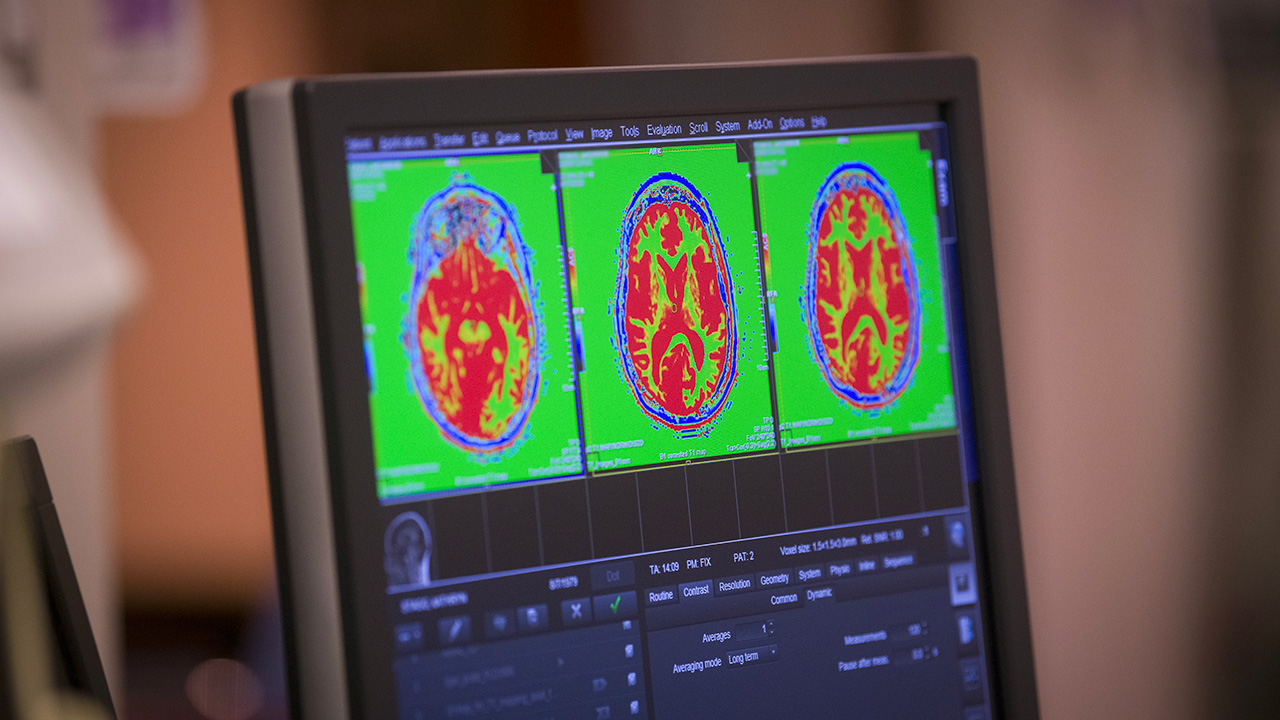Sunnybrook researchers demonstrate groundbreaking evidence of focused ultrasound enhanced delivery of targeted antibody therapy to breast cancer that spread to the brain
Researchers at Sunnybrook Health Sciences Centre are the first in the world to demonstrate the safe delivery of an antibody therapy across the blood-brain barrier using MRI-guided focused ultrasound.
The research team captured world-first images of the antibody therapy drug, Trastuzumab, precisely targeting tumours which spread to the brain from breast cancer, across the blood-brain barrier.
Antibody therapies can help the immune system fight cancer cells and are often used with radiation and chemotherapy treatment. The blood-brain barrier is made up of a thin layer of cells that protect the brain from toxins and other viruses and bacteria, but also blocks helpful therapies, such as Trastuzumab, from reaching the brain.
MRI-guided focused ultrasound technology uses ultrasound waves to non-invasively and temporarily open the blood-brain barrier enabling therapeutics to reach specified areas of the brain.
The study is published in Science Translational Medicine.
“This is the first visual confirmation that focused ultrasound can improve the delivery of targeted antibody therapy across the blood-brain barrier,” says Dr. Nir Lipsman, the study’s principal investigator and director of the Harquail Centre for Neuromodulation at Sunnybrook. “These are preliminary, but very promising, results that with continued research have implications well beyond brain cancer and to other neurological conditions, including Parkinson’s disease and Alzheimer’s, where the blood-brain barrier poses a challenge to drug delivery.”
The findings are the culmination of nearly 20 years of research initiated by focused ultrasound innovator and pioneer, Dr. Kullervo Hynynen, Vice President Innovation, Sunnybrook Research Institute.
“This is a breakthrough moment in the field of focused ultrasound. It is the result of incredible collaboration among various teams over the past two decades, including oncology, surgery, pharmacy, nuclear medicine, neuroradiology, medical physics and more,” explains Dr. Hynynen.
“It is a great story of preclinical to clinical research and the dedication of investigators to find innovative ways to personalize treatment for patients in the future.”
Metastatic breast cancer, also known as Stage IV breast cancer, starts in the breast and spreads to other areas which can include the bone, liver or other organs, and brain. It’s estimated that brain metastases in patients with Her2-positive breast cancer are increasing in prevalence by approximately 30 per cent and are associated with greater morbidity and mortality despite therapeutic advances. Currently, breast cancer brain metastases are treated with a combination of open neurosurgery, radiation and chemotherapy. However, depending on the location and number of brain metastases, options for surgery and radiation may be limited and it can be difficult for therapy to penetrate tumours in the brain.
“The early data in this study suggests delivery of antibody therapy directly to tumours using focused ultrasound may impact treatment efficacy, with tumours slightly decreasing in size, with varying results for patients between seven to 31 per cent during the study, on average to 21 per cent,” says Dr. Rossanna Pezo, medical oncologist in the Odette Cancer Centre at Sunnybrook. “The reduction in tumour size is promising but should be interpreted with caution as further research on a larger scale is needed.”
A helmet-like focused ultrasound device, developed by InSightec, was used in conjunction with MRI guidance in four patients in this world-first phase I trial to direct ultrasound waves precisely to areas of the brain where tumours were clearly visualized. While in the MRI machine, participants received Trastuzumab, a compound that is 100 times larger than the typical compound that can enter the brain across the blood-brain barrier. Focused ultrasound was used to temporarily open the blood-brain barrier to allow the passage of the antibody therapy, into the tumor tissue.
Researchers used an innovative approach to confirm the drug’s delivery on brain scans. Trastuzumab was radio-labelled, meaning the antibody therapy was ‘tagged’ with a special compound that could be easily visualized using single photon emission computerized tomography (SPECT) imaging. Scans were performed before the procedure as well as after, and showed significantly increased uptake of antibody therapy after focused ultrasound.
Patients went home the same day and were observed after 24 hours, one month, three months and one year. Researchers determined the procedure to be safe and well-tolerated by patients.
These results set the stage for the possibility of delivering a host of both established and novel therapies to numerous brain conditions, that otherwise cannot gain access to the brain.
The radiopharmaceutical drug was developed by Professor Raymond Reilly and his team at the Centre for Pharmaceutical Oncology at the Leslie Dan Faculty of Pharmacy at the University of Toronto.
Sunnybrook is a Centre of Excellence in Focused Ultrasound – the only Canadian site to be recognized as such by the Focused Ultrasound Foundation.
“The multidisciplinary team at Sunnybrook are pioneers in the use of focused ultrasound to treat a variety of brain disorders,” says Neal F. Kassell, MD, chairman of the Focused Ultrasound Foundation. “This study demonstrating the effectiveness of focused ultrasound to open the blood-brain barrier for facilitating delivery of antibodies to the brain is an important milestone in the development of new approaches for treating brain tumors and other neurological disorders. We are pleased to be partnering with this esteemed group.”
The discovery of novel interventions for the world’s most complex brain conditions through research and collaboration are critical elements in the pursuit of innovative approaches to treatment for inter-disciplinary teams in brain sciences at the new Garry Hurvitz Brain Sciences Centre, which is being built at Sunnybrook.
A key driver of Sunnybrook’s research in focused ultrasound is philanthropic investment. The study was supported by Focused Ultrasound Foundation, InSightec, Canadian Institutes of Health Research, The Kavelman Fonn Foundation, Canadian Breast Cancer Foundation, Canadian Cancer Society, and the Harquail Centre for Neuromodulation.
For more information about focused ultrasound at Sunnybrook Health Sciences Centre, visit sunnybrook.ca/focusedultrasound.
Find out about focused ultrasound oncology clinical trials.
Learn more about Sunnybrook’s Harquail Centre for Neuromodulation.
Media inquiries:
Jennifer Palisoc
Communications Advisor
Sunnybrook Health Sciences Centre
jennifer.palisoc@sunnybrook.ca




